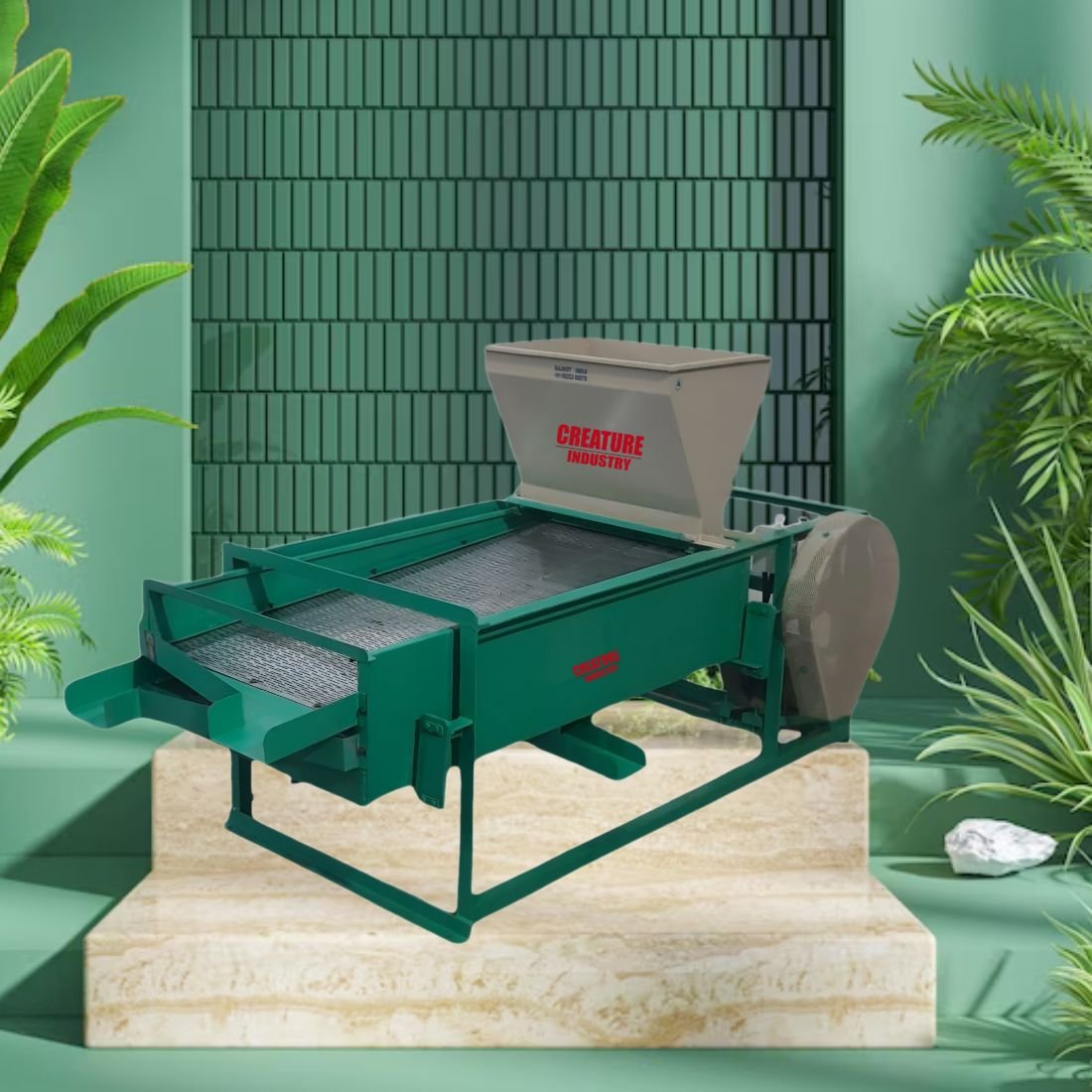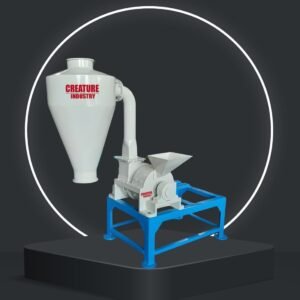Grain Destoner Machine
₹15,000
| Name | Grain Destoner Machine |
| Power Consumption | 2 Kwh |
| Voltage | 220V |
| Material Of Construction | MS |
| Motor Power | 2 HP |
| Electricity Connection | Single Phase |
| Operation Mode | Automatic |
| Usage/Application | Stone Removing |
| Warranty | 1 Year |
| I Deal In | New Only |
| Weight | 200 |
| Surface finish | Powder Coated |
| Country Of Origin | Made In India |
| Brand | Creature Industry |
| Price Range | ₹15000 – ₹300000 |
The Grain Destoner machine is created to remove stones, pebbles, or other waste from your bulk materials like grains, pulses, seeds, or nuts. It’s normally used in our agriculture and food processing to confirm that the final product is free from unwanted or harmful materials.
What is a Grain Destoner Machine?
A Grain Destoner machine is a technical outfit designed for the cleaning and separation of grains grounded on their viscosity. Its primary function is to remove unwanted accouterments similar to monuments, heavy contaminations, and foreign patches from bulk amounts of grains.
This process is pivotal in improving the quality and safety of grains for consumption, as well as in perfecting the effectiveness of the posterior processing method. They are crucial features and aspects associated with Grain Destoner machines
The working principle of the Grain Destoner Machine relies on the differences in the density of the grains and contaminants. By creating a controlled environment of airflow and vibration, the machine sorts the grains by weight and size, effectively separating stones from the grains.
Types of Grain Destoner Machines
There are lots of different types of grain separators out there and they are all made to suit different industrial needs. Some of the most common types include:
Suction Type Destoner
This is truly the most common machine that mills grains today. It uses air suction along with special vibration technology on the deck to separate stones easily from grains like rice, wheat, and pulse beans.
Pressure Type Destoner
Unlike suction machines though, this one uses positive pressure stronger air pressure actually to help sort stones from grains. Really nice for grains that are tricky to clean up with suction machines.
Combined Destoner-Cleaner
It is a multi-purpose machine that combines the functions of a cleaner and a destoner. This type is very useful in compact areas where space-saving multi-tasking machines are required.
Gravity Table Destoner
This model employs a gravity-based separation process that guarantees precision sorting. It is suitable for high-capacity plants that need effective precision.
Applications of Grain Destoner Machines
Destoners are not just for rice or wheat, their uses include:
Rice Mills: Eliminating black stones and mud lumps from raw rice.
Wheat Plants: Cleaning wheat before milling, to enhance flour quality.
Maize Processing: Removing small stones from kernels of corn.
Pulse Plant: Clean pulses of hard impurities. Coffee and Cocoa
Processing: Stones removal which get mixed with beans during their harvesting. The destoner machine increases product quality, decreases the wear and tear of the machine, and ensures regulatory compliance with food safety and hygiene standards.
How Does a Grain Destoner Machine Work?
A Grain Destoner Machine typically operates through the following stages:
1. Feeding
Grains are loaded into the machine through a hopper. The input grains may be mixed with various impurities, including stones, dust, and dirt.
2. Air Separation
Once inside the machine, the grains are exposed to a flow of air, which helps to separate the lighter materials, such as dust and chaff, from the heavier grains and stones. The airflow is carefully controlled to ensure that only unwanted particles are removed.
3. Vibration and Vibration Adjustment
A vibrating screen system is employed to further separate the stones and heavier contaminants from the grains. The vibration causes the heavier impurities to move downward while the lighter grains are lifted upward, resulting in a more efficient separation process.
4. Discharge
After the separation process, the clean grains are collected and discharged from the machine, ready for further processing, packaging, or storage. Meanwhile, the stones and other foreign materials are removed via a dedicated outlet.
Benefits of Using a Grain Destoner Machine
1. Improved Food Safety Standards
By eliminating potentially hazardous impurities, a grain destoner machine improves food safety, which is one of its main advantages. Ensuring that stones and other foreign elements are removed during grain processing is essential for upholding strict food safety regulations since they pose major health hazards if consumed.
2. Increased Processing Efficiency
By automating the impurity separation process, a grain destoner machine greatly accelerates the grain processing cycle. This raises the operation’s overall efficiency by reducing manual work and improving throughput.
3. Cost-Effective Solution
By reducing product waste and enhancing the quality of the processed grain, a high-quality grain destoner machine can help processors save money over time. The equipment lowers operating expenses by removing the requirement for manual labor in the sorting and cleaning of the grains.
4. Better Storage and Shelf Life
By removing impurities, the machine helps to prolong the shelf life of grains. Clean grains are less likely to attract pests, mold, or other contaminants during storage, ensuring that the grains stay fresh for longer periods.
How to Choose the Right Grain Destoner Machine
Investing in a destoner for your operations requires careful consideration of the following aspects:
1. Capacity Requirements
Evaluate the effectiveness of your facility’s daily grain output and select a machine with the appropriate capacity (measured in tons per hour).
2. Type of Grain
Certain machines may be fabricated for specific grains, such as rice or maize. Always verify compatibility before buying.
3. Energy Efficiency
Prefer models with better energy performance, particularly for large-scale operations.
4. Maintenance and Endurance
Such machines tend to have an easier maintenance protocol, and are more long-lasting, as modular construction, along with bodies that resist corrosion, increase durability.
5. Warranty/Training/Technical Assistance
Make sure the manufacturer offers support for operation warranty training and technical guidance.
Installation and Maintenance Tips for Optimal Performance
As with any machine, proper installation and consistent upkeep is critical:
- Install the device on a level surface that does not vibrate.
- Change filters and decks to avoid clogging.
- Apply grease to movable parts as instructed by the company’s manual.
- Check airflow control parameters relative to grain weight.
- Perform regular maintenance checks to identify deterioration in good time.
By following these steps, you can increase the lifespan of your destoner while maintaining seamless grain processing.
Why Choose Us for Your Grain Destoner Needs?
We provide a comprehensive selection of high-end Grain Destoner Machines fitted for the modern requirements of grain processing units. Our machines feature:
Precision and Reliability Engineering
Real-World Conditions Mechanical Testing
Expert Support Team Backing
Quality Guarantee for Competitive Pricing
Having years of experience in grain processing, we know the challenges facing businesses today and the solutions that improve productivity while guaranteeing food safety compliance.
Destoner Machine Prices
Even if grain destoner machines are sold on the web at varying rates, the creature industries sell them starting from only ₹15000 which makes it easy for small-scale farmers and businesses to buy them. Despite its low cost, this basic model has been built to be highly efficient and reliable. However, for larger businesses looking for more advanced features, creature industries have destoners that are higher up on the price ladder. These advanced versions are fitted with high technology, making them last longer and providing the best performance in tough working conditions. The high-end destoner machines provided by creature industries go up to a cost of ₹300000.
Due to the price difference, Creature Industries can assure that for every price and level of demand a destoner machine is always available. No matter, if you are a small farmer or a large farmer, you can rely on their products for a portion of the highest grain cleaning and impurities removal. Examine Creature Industries‘ “destoner machines” today, and buy equipment that claims to give in terms of quality, efficiency, and value up to the user.
Conclusion
The Grain Destoner Machine is a vital piece of equipment for anyone involved in grain processing. By efficiently removing stones and other contaminants, it helps improve the quality, safety, and marketability of grains. Whether in food processing, seed production, or animal feed production, this machine plays a crucial role in ensuring the purity and value of the final product. With the right machine, businesses can streamline their operations, reduce waste, and deliver high-quality grains to the market.
1 review for Grain Destoner Machine
Related products
-
2 In 1 Pulverizer Machine
₹12,000 -
Gravy Machine
₹12,000 -
Mirchi Pisne Ki Machine
₹14,000
 English
English 















mohit rao –
best product, you should also purchase and use this.